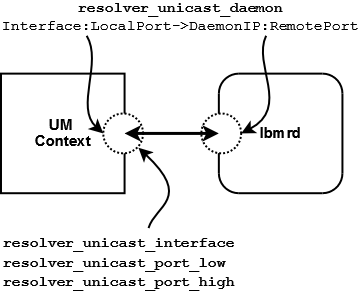4.5. Unicast Resolver Network Options
This diagram shows a single unicast resolver daemon configured with resolver_unicast_daemon.
If using multiple lbmrd instances with a single context, you can configure resolver_unicast_interface and resolver_unicast_port_low/high and omit the Interface:LocalPort section of resolver_unicast_daemon.
See also Unicast Topic Resolution for more information.
4.5.1. resolver_unicast_daemon (context)
Add a unicast resolver daemon specification to the list of unicast resolver daemons. Unlike most other UM settings, every time this setting is called, it adds another daemon specification to the list and does NOT overwrite previous specifications. Each entry contains the interface, source port, resolver IP, and destination port for a single daemon. For the configuration file as well as string versions of setting this option, the string value is formatted as [Iface[:Src_Port]->]IP:Dest_Port. Iface is the interface to use (previously set via resolver_unicast_interface). Src_Port is the source port to use (previously resolver_unicast_port). IP is the resolver daemon's IP address (previously resolver_unicast_address), Dest_Port is the resolver daemon's UDP port (previously resolver_unicast_destination_port). Either the Src_Port or both the Iface and Src_Port may be omitted, in which case the default resolver_unicast_interface and resolver_unicast_port settings are used. Because each entry adds a new daemon specification and does not overwrite previous values, an entry or string with the IP address of 0.0.0.0 and TCP port of 0 removes all previous daemon specifications. At least one daemon specification means the context does not use multicast topic resolution. Possible formats of this option are: Interface:LocalPort->DaemonIP:RemotePort, Interface->DaemonIP:RemotePort or DaemonIP:RemotePort. Interface may be specified in any of the ways described in Specifying Interfaces.
4.5.2. resolver_unicast_interface (context)
Specifies the network interface over which UM receives unicast Topic Resolution messages. Can specify full IP address of interface, or just network part (see Specifying Interfaces for details). Default is set to INADDR_ANY, meaning that it will accept unicast Topic Resolution messages on any interface.
4.5.3. resolver_unicast_port_high (context)
The highest local UDP port in a range of ports used for unicast topic resolution messages. The UM resolution daemon (lbmrd) sends unicast topic resolution messages to the UDP port range defined by this option and resolver_unicast_port_low.
4.5.4. resolver_unicast_port_low (context)
The lowest local UDP port in a range of ports used for unicast topic resolution messages. The UM resolution daemon (lbmrd) sends unicast topic resolution messages to the UDP port range defined by this option and resolver_unicast_port_high.
4.5.5. resolver_unicast_receiver_socket_buffer (context)
Value used to set SO_RCVBUF value of the UDP receivers
for unicast topic resolution messages. In some cases the OS will not allow all of this
value to be used. A value of 0 instructs UM to use the default
OS values. See the section on socket buffer
sizes for platform-dependent information.
